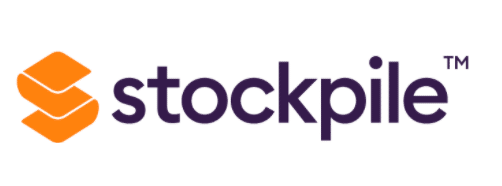
Stockpile puts a unique twist on purchasing stocks. Instead of buying stocks directly, you purchase a stock gift card.
This is better than giving a toy or something else your to son or daughter that they'll eventually outgrow. And it can be great gift idea for full-grown adults too!
Owning fractional shares in popular companies like Amazon, Coca-Cola, Netflix and more gives the recipients of your the gifts the opportunity to watch their value grow over the years.
We were also happy to see Stockpile recently switch its pricing model to become a virtually fee-free stock broker. Keep reading our full review of StockPile to learn more.

Quick Summary
- Allows users to buy stock giftcards
- Supports fractional share investing
- Stockpile charges a $4.95 monthly fee
Stockpile Details | |
|---|---|
Product Name | Stockpile stock gift cards |
Min Gift Card | $1 |
Service Charges | $4.95/mo fee |
Trade Fees | $0 |
Account Type | Individual and Custodial |
Promotions | None |
What Is Stockpile?
Stockpile was founded by CEO & Co-founder Avi Lele in 2010. The idea was to create a platform that would make it easier to give the gift of stock.
The stock investing industry has changed a lot since 2010. Most importantly, there are now a host of brokers that offer commission-free trades.
Thankfully, Stockpile has evolved as well to remain price-competitive. And it still offers one of the easiest ways to gift stock ownership to friends and family.
How Does It Work?
If you want to give a stock gift card to someone, you’ll first need to open an account with Stockpile. Next, purchase a stock gift card. eCards have face values of $1 to $500. They can be texted, emailed, or printed at home.
You can also purchase a physical, plastic card in amounts of $25, $50, or $100. Compare to self-printed eCards, the plastic cards look more impressive, as shown below. However, you will have to pay shipping charges for orders under $100.

Buy Fractional Shares
Rather than paying over $1,000 for a share of Amazon, you can buy it for only $50. You’ll then own a fractional share of Amazon stock. 0.05 of a share to be exact.
While your stock won’t go up as much as someone who owns whole shares of Amazon, it will still increase in value. You can also diversify by buying other shares.
Investment Education
Stockpile offers a number of ways to learn about investing. From resources available on their website to actual use of their apps (available on the iPhone and Android).
When using the app, you can watch your investments grow, see trends and choose from top growth stocks, top dividend payers, upcoming earnings and more. It's all meant to help you become a better investor.
Trading Limitations
Stockpile says that its members can trade over 4,000 stocks and ETFs. While that may sound like a lot, it's less supported assets than you'll find with other brokers. Robinhood, for example, supports over 5,000 stocks and ETFs. Note that you also can't trade mutual funds on Stockpile.
Also, Stockpile doesn't provide real-time trading. Trades are instead executed at the end-of-day price. So if you're hoping to do any active trading, this definitely isn't the platform for you.
Are There Any Fees?
There are no fees charged for buying gift cards, funding an account, or for trading stocks (buying or selling).
You will have to pay shipping fee for physical gift card purchases of less than $100. And there's a $25 outgoing wire fee. But other than in those two cases, you shouldn't have to pay anything at all to use Stockpile.
However, there is a $4.95/mo account fee - which is much higher than comparable investing apps like Acorns or Stash. Also, they charge a $5 per quarter inactivity fee if you don't enroll in a membership plan. This is a big drawback.
The $4.95 monthly fee includes on adult account, and up to five custodial accounts.
Trading on Stockpile is commission-free.
How Does Stockpile Compare?
There are few companies that offer stock gifts cards like Stockpile does. This has been especially true since it acquired SparkGift in 2016, which was one of its only real competitors.
Still, there are other ways to give the gift of stock, even if they don't involve shiny gift cards. Virtually any broker will allow you to transfer stock to someone else electronically, provided that your recipient also has an account with the same broker. You can also create custodial accounts for your children with your preferred broker to purchase stocks on their behalf.
Either of these options may be better for your recipients over the long-term. Top brokers like Vanguard, TD Ameritrade, or Fidelity all offer far more account options (Stockpile doesn't offer retirement accounts or joint accounts), trading tools, and supported assets than Stockpile.
Finally, it should be noted that if you're specifically looking to help your child save for college, gifting stocks inside a 529 account will help them save on taxes. In these cases, you may want to use GiftOfCollege.com instead which offers gift cards that can be linked to 529 plans.
The monthly fee really puts Stockpile in a gap with its competitors.
How Do I Open An Account?
After giving your gift card to the recipient, to use it, they’ll need to create a Stockpile account as well. This is where the process could go a little smoother since you're basically opening a brokerage account.
If the recipient is a minor, they’re parents or legal guardian will need to open a custodial account for them. The minor’s name can be on the account and they can still use it.
Once your account is open, you’ll need a way to deposit funds into it. This can be done by linking your bank account or by using a debit card.
How Do I Contact Stockpile?
Stockpile doesn't publish a customer service phone number. If you have any trouble with the platform, your best option is probably to try to scour the company's Help Center first.
If you do need personal assistance, you an email their team at support@stockpile.com. Currently, Stockpile has a "Great" rating on Trustpilot of 3.4/5 out of over 1,700 reviews. The company also has a B rating with the Better Business Bureau but is not BBB-accredited.
However, over the last few month's, we've seen a lot of complaints about Stockpile's customer service - especially as they rolled out the monthly fee.
Plus, in our experience, to do tasks like Close Your Account, you have to fill out a web-form. This doesn't seem the most efficient or secure approach.
Why Should You Trust Us?
I have been writing about and reviewing investment firms and brokerages since 2009, and have reviewed almost every US-based investment firm open to individual investors. I have seen this space evolve from high cost to low cost options, and have seen the amount of investment tools grow for individuals.
Furthermore, we have been polling our audience for years to find out which investment firms they trust and use, and that's how we put together our annual rankings of the best investment companies.
Finally, we have our compliance team that regularly checks and updates the facts on our reviews.
Is It Worth It?
The focus is Stockpile isn’t to be the best discount brokerage. Instead, it is all about gifting stocks through gift cards. You can even purchase them in a limited number of physical stores.
The idea of giving someone a stock gift card is great for younger people who are used to such simple concepts, rather than wading through the process of opening a brokerage account.
Additionally, they’ll learn to be better investors through all the investment education Stockpile provides.
However, the price of $4.95 per month seems very excessive compared to other brokerage and custodial account options.
Stockpile FAQs
Here a few common questions that people have about Stockpile:
Does Stockpile take a percentage of assets?
No, Stockpile doesn't charge any advisory fees. They do have a $4.95 per month flat fee for the family (one adult and up to five custodial accounts).
Does Stockpile allow options trades?
No, it only supports stocks, ETFs, and ADRs.
Can you reinvest dividends with Stockpile?
Yes, if a stock that you own issues a dividend, you'll have the option to reinvest it into the company or receive it as cash deposited into your account.
Can stock gift cards be split?
No, you'll need to use the entire gift card amount on one stock. You can then sell a portion of your stock shares to purchase shares of a different stock if you'd like.
Do Stockpile's gift cards have expiration dates?
No, they can be redeemed at any time.
Is Stockpile available in every U.S. state?
Stockpile is available in every state except Connecticut.
Stockpile Features
Account Types |
|
Gift Card Amounts |
|
Service Charges | $4.95 monthly fee |
Funding Options |
|
Tradable Assets |
|
Account Minimum | $0 |
Stock Commissions | $0 |
ETF Commissions | $0 |
No-Transaction-Fee (NTF) Mutual Funds | N/A |
Options Costs | N/A |
Basic Account Fee | $0 |
Margin Rates | N/A |
Fractional Shares | Yes |
Banking Services | No |
Customer Service Number | None listed |
Customer Service Email | support@stockpile.com |
Mobile App Availability | iOS and Android |
Promotions | None |
Stockpile Review
-
Commission & Fees
-
Customer Service
-
Ease Of Use
-
Tools & Resources
-
Investment Options
-
Specialty Services
Overall
Summary
Stockpile is a brokerage platform that allows for fractional share investing, stock gift cards, and tries to make investing kid-friendly.
Pros
- No service charges
- No trade commissions
- Fractional share investing
- Offers custodial accounts
Cons
- Trades don’t execute in real-time
- Limited number of supported assets
- Doesn’t offer any retirement accounts

Robert Farrington is America’s Millennial Money Expert® and America’s Student Loan Debt Expert™, and the founder of The College Investor, a personal finance site dedicated to helping millennials escape student loan debt to start investing and building wealth for the future. You can learn more about him on the About Page or on his personal site RobertFarrington.com.
He regularly writes about investing, student loan debt, and general personal finance topics geared toward anyone wanting to earn more, get out of debt, and start building wealth for the future.
He has been quoted in major publications, including the New York Times, Wall Street Journal, Washington Post, ABC, NBC, Today, and more. He is also a regular contributor to Forbes.
Editor: Clint Proctor Reviewed by: Claire Tak
